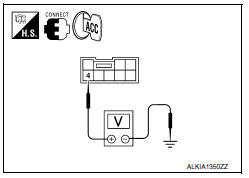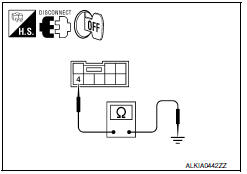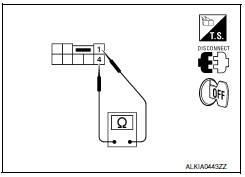Nissan Maxima Service and Repair Manual: B2556 push-button ignition switch
Description
The switch that changes the power supply position. BCM maintains the power supply position status. BCM changes the power supply position with the operation of the push-button ignition switch.
DTC Logic
DTC DETECTION LOGIC

DTC CONFIRMATION PROCEDURE
1.PERFORM DTC CONFIRMATION PROCEDURE
-
Start the engine and wait for at least 100 seconds.
-
Check "Self Diagnostic Result" with CONSULT.
Diagnosis Procedure
Regarding Wiring Diagram information, refer to SEC-147, "Wiring Diagram" or SEC-128, "Wiring Diagram".
1.CHECK PUSH-BUTTON IGNITION SWITCH INPUT SIGNAL
-
Turn ignition switch OFF.
-
Disconnect push-button ignition switch harness connector.
-
Check voltage between push-button ignition switch harness connector M38 terminal 4 and ground.


2.CHECK PUSH-BUTTON IGNITION SWITCH
Refer to SEC-47, "Component Inspection".
3.CHECK INTERMITTENT INCIDENT
Refer to GI-41, "Intermittent Incident".
Inspection End.
4.CHECK PUSH-BUTTON IGNITION SWITCH CIRCUIT FOR SHORT
-
Disconnect BCM harness connector and IPDM E/R harness connector.
-
Check continuity between push-button ignition switch harness connector M38 terminal 4 and ground.


Component Inspection
1.CHECK PUSH-BUTTON IGNITION SWITCH
-
Turn ignition switch OFF.
-
Disconnect push-button ignition switch harness connector.
-
Check continuity between push-button ignition switch terminals under the following conditions.


 B2555 stop lamp
B2555 stop lamp
Description
BCM detects the stop lamp status and confirms the stop
lamp switch ON/OFF status. BCM confirms the
engine start condition according to the stop lamp switch ON/OFF status.
DTC Logic
...
 B2557 vehicle speed
B2557 vehicle speed
Description
BCM receives the 2 vehicle speed signals via CAN
communication. One signal is transmitted by the "combination
meter". Another signal is transmitted by "ABS actuator and electric unit ...
Other materials:
P0500 VSS
Description
ECM receives vehicle speed signals from two different paths via CAN
communication line: One is from the
ABS actuator and electric unit (control unit) via the combination unit and the
other is from TCM.
DTC Logic
DTC DETECTION LOGIC
NOTE:
If DTC P0500 is displayed with ...
Steering switch
Removal and Installation
REMOVAL
Remove the driver airbag module. Refer to SR-12, "Removal and
Installation".
Remove the steering wheel audio control switch screws (A).
Release the steering wheel audio control switch harness clips (B).
Remove the steering wheel audio control switche ...
If your vehicle overheats
If your vehicle is overheating (indicated by an
extremely high temperature gauge reading) or if
you feel a lack of engine power, detect abnormal
noise, etc., take the following steps.
WARNING
Do not continue to drive if your vehicle
overheats. Doing so could cause engine
damage or a vehi ...
Nissan Maxima Owners Manual
- Illustrated table of contents
- Safety-Seats, seat belts and supplemental restraint system
- Instruments and controls
- Pre-driving checks and adjustments
- Monitor, climate, audio, phone and voice recognition systems
- Starting and driving
- In case of emergency
- Appearance and care
- Do-it-yourself
- Maintenance and schedules
- Technical and consumer information
Nissan Maxima Service and Repair Manual
0.0097
